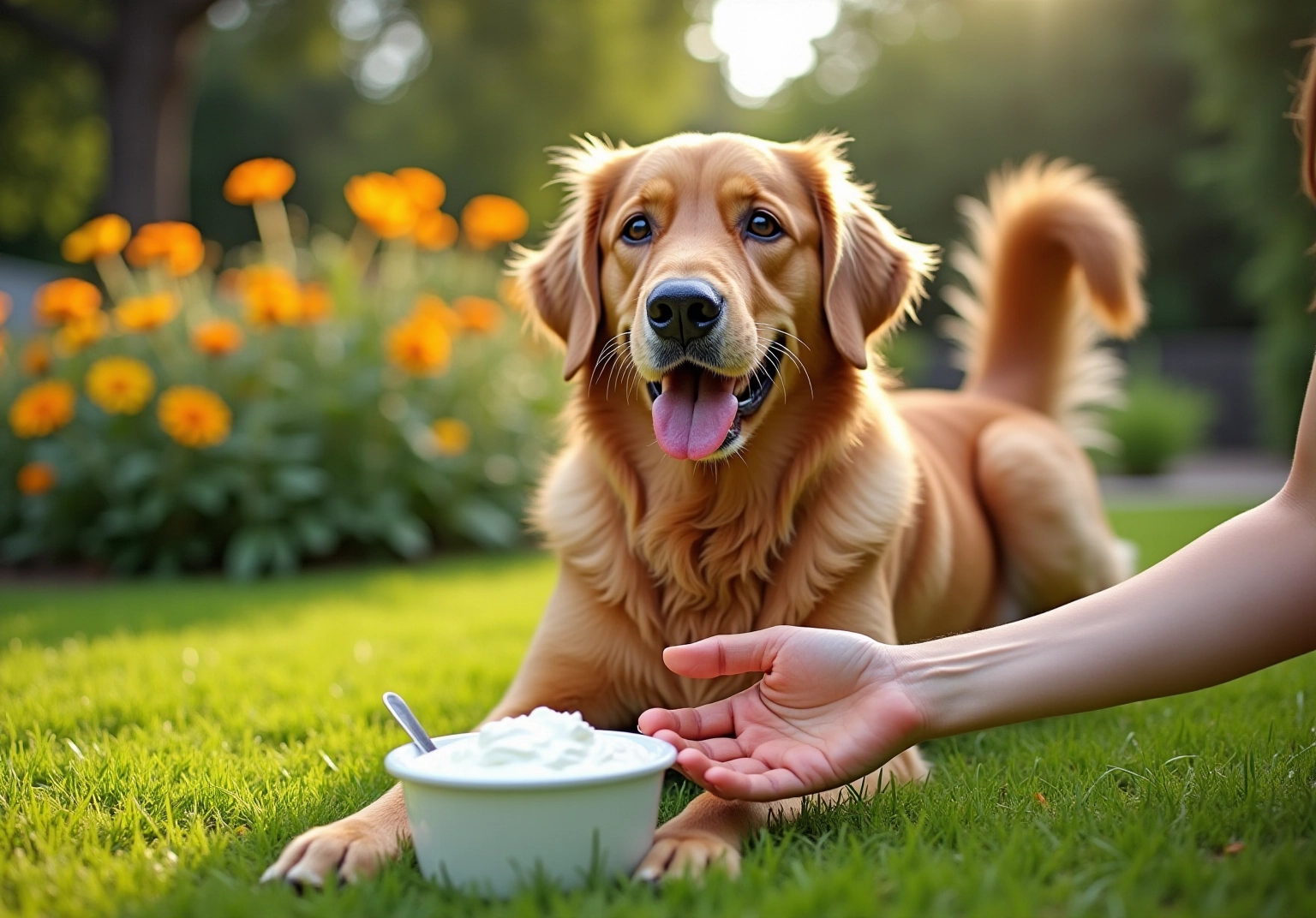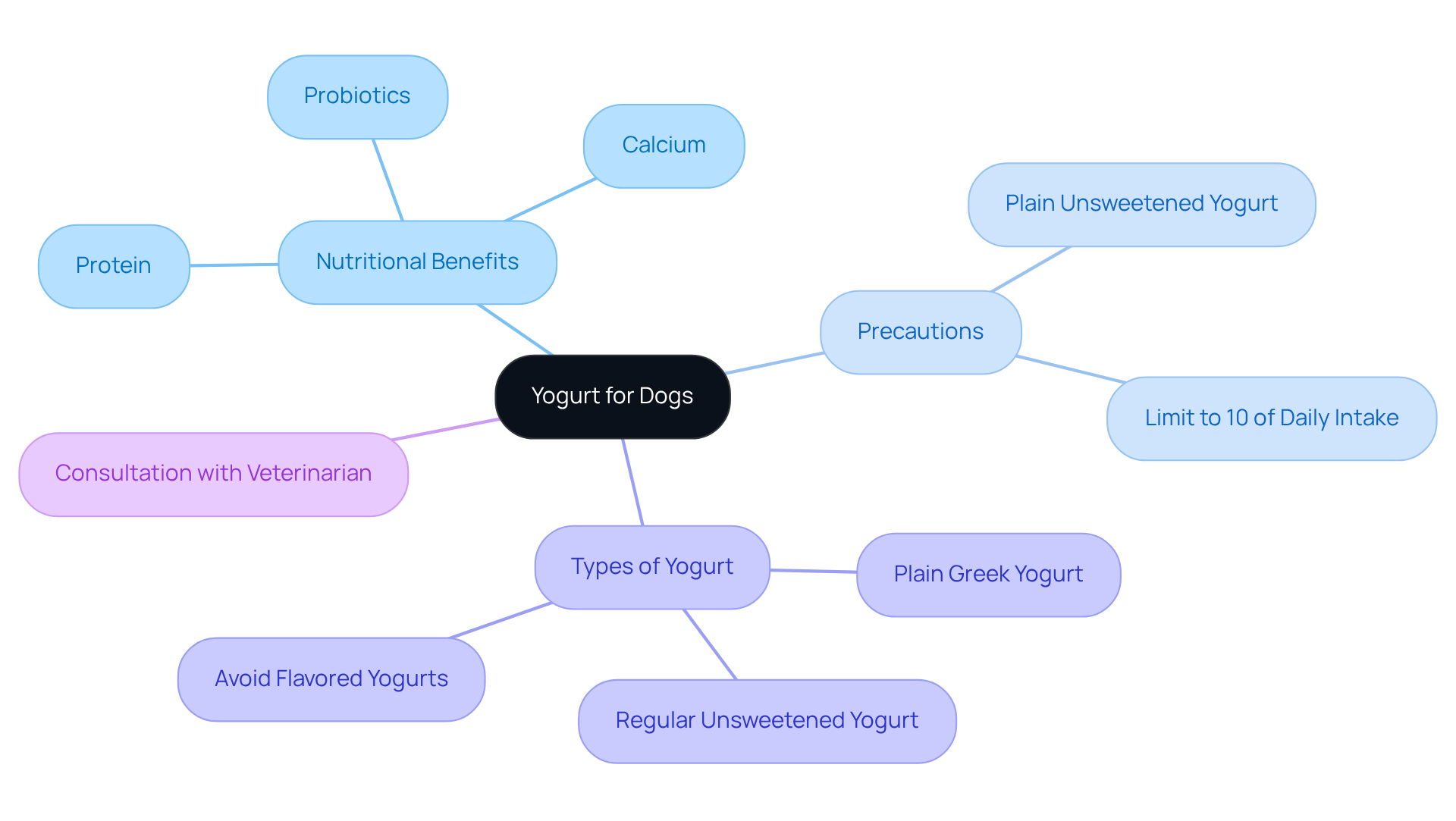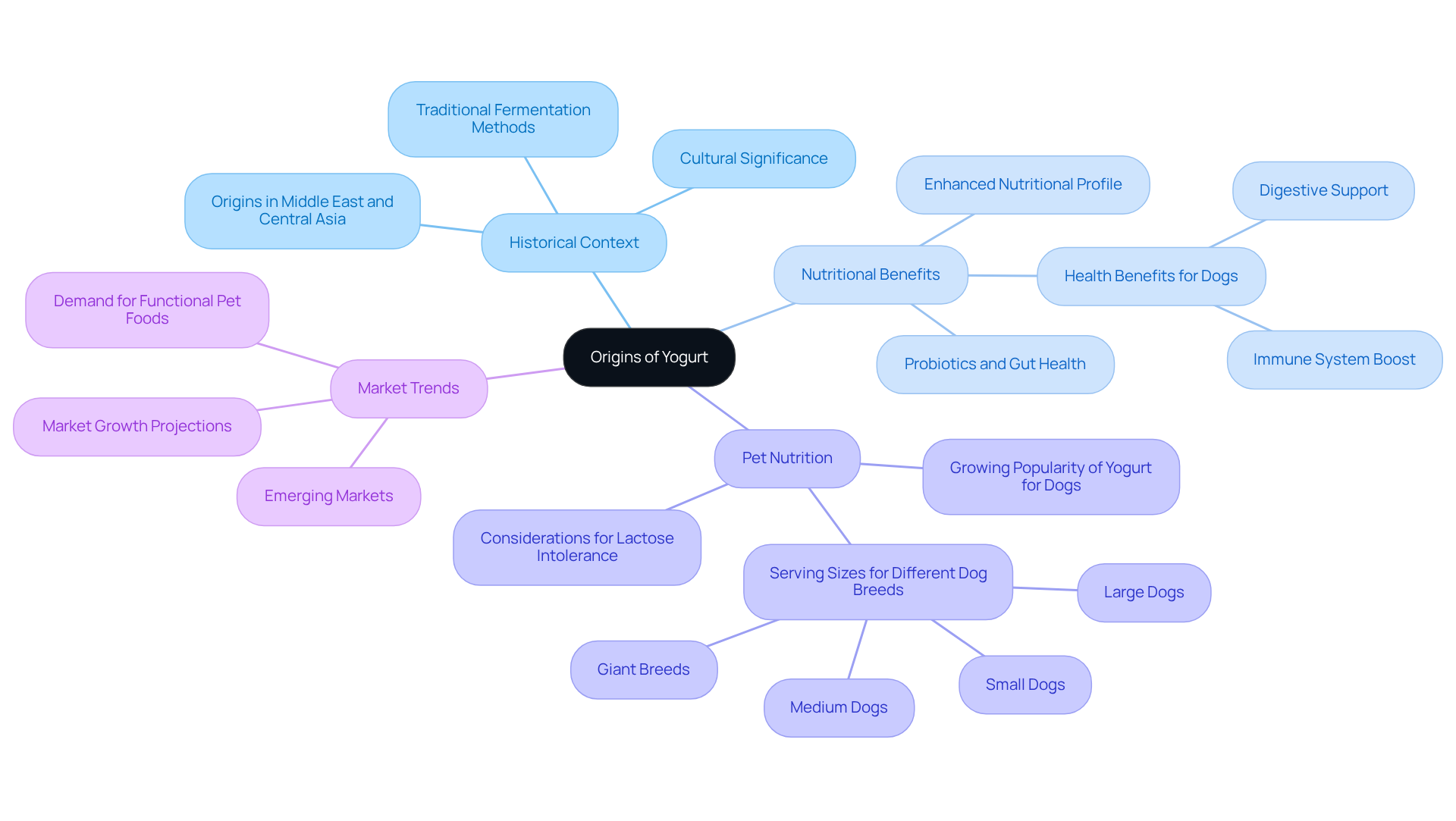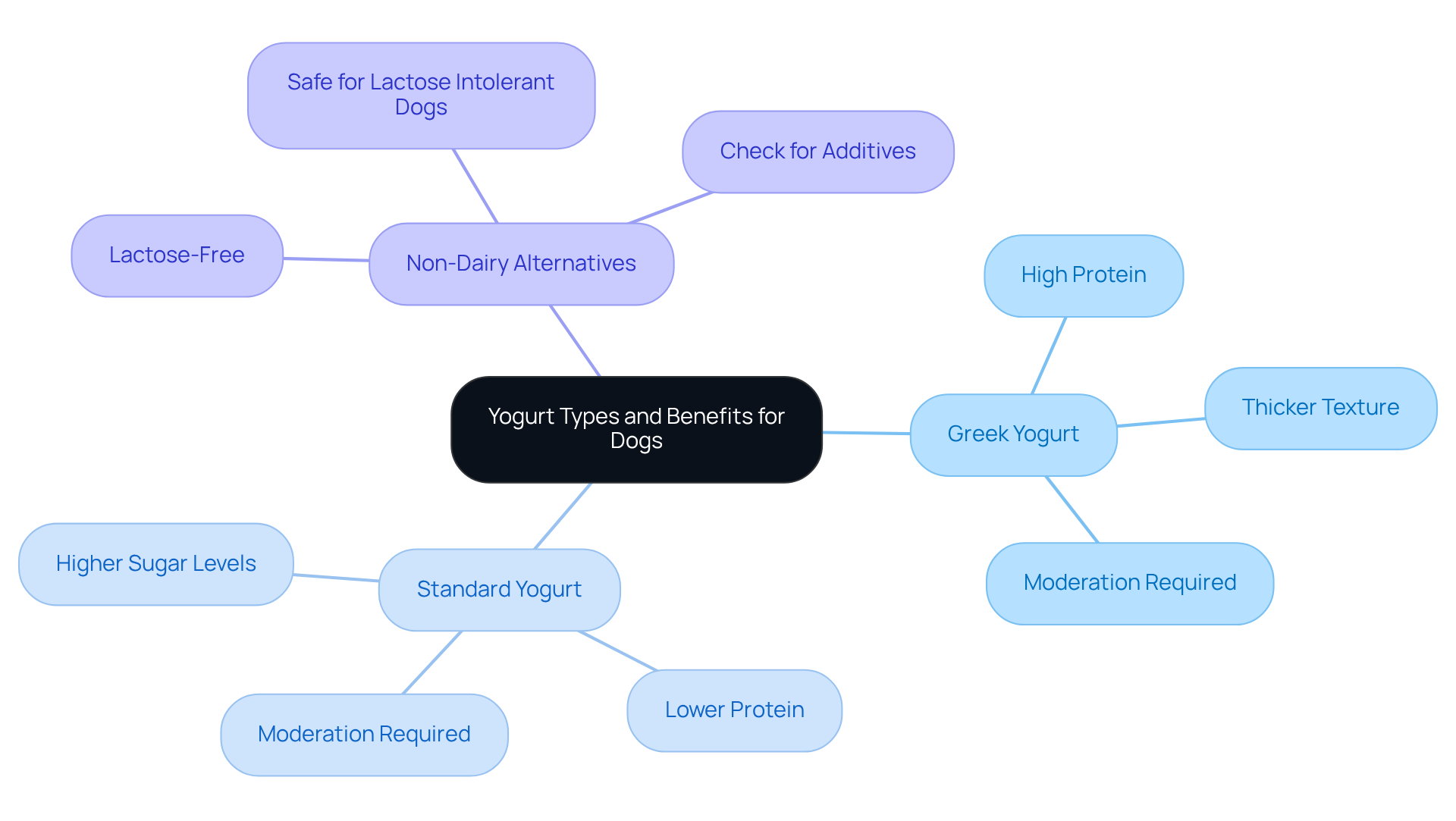
Can Dogs Have Yogurt? Understanding Its Benefits and Safety
Overview
As a loving pet owner, you might wonder about the best ways to nurture your furry friend. It’s heartwarming to know that dogs can enjoy yogurt, especially plain, unsweetened varieties, which offer valuable nutritional benefits like:
- Protein
- Calcium
- Probiotics that support their digestive health
However, it’s essential to approach this treat with care. Many dogs can be sensitive to lactose, and introducing yogurt gradually is key to ensuring it fits comfortably into their diet. Remember, moderation is crucial; yogurt should only make up a small part of their meals to avoid any digestive discomfort. By being attentive to your dog’s needs, you can provide them with a delightful and healthy addition to their diet while keeping their well-being at the forefront of your care.
Introduction
Yogurt has become a beloved treat for many pet owners, but it’s essential to approach the question of whether dogs can indulge in this creamy delight with care.
We understand that as pet parents, you want the best for your furry companions. Yogurt is rich in essential nutrients like protein, calcium, and probiotics, which can positively impact a dog’s diet, potentially boosting digestive health and immunity.
Yet, the variety of yogurt options available can be overwhelming, and it’s crucial to ensure that the chosen type is safe and appropriate for each individual dog.
Can you confidently include yogurt in your beloved pet’s meals, or are there hidden concerns to consider? Your pet’s well-being is our priority, and we’re here to help you navigate these choices with compassion and understanding.
Define Yogurt: What It Is and Its Nutritional Value for Dogs
Yogurt is a delightful fermented dairy product that many pet owners consider when they ask, can dogs have yogurt? By adding specific bacterial cultures to milk, yogurt achieves a thick, creamy texture that not only appeals to our furry friends but also provides essential nutrients. Dairy can be a wonderful source of protein, calcium, and probiotics, which are all beneficial for digestive health. The probiotics in yogurt help maintain a healthy gut flora, potentially aiding digestion and enhancing the immune system, which is something we all want for our pets.
It’s reassuring to know that studies indicate that when considering if can dogs have yogurt, fermented milk can contain as much as 450 mg of calcium per cup, making it a valuable addition to a dog’s nutrition. However, as caring pet owners, we must be cautious. It’s crucial to choose plain, unsweetened yogurt without artificial additives or sugars, as these can be harmful to our canine companions. Remember, treats like yogurt should only make up about 10% of a dog’s daily caloric intake to prevent digestive issues and ensure balanced nutrition.
For dogs with sensitive stomachs, a gentle approach is to start with a small amount of plain Greek yogurt, especially if you are wondering if can dogs have yogurt. Greek yogurt is particularly appealing because it has a higher protein content and lower lactose levels, making it easier for some dogs to digest. As always, it’s wise to consult with a veterinarian before introducing any new food into your dog’s diet. This step ensures that yogurt is a safe and suitable option tailored to your pet’s unique needs. Together, we can make informed choices that support our furry friends’ health and happiness.

Explore the Origins of Yogurt: Historical Context and Development
Yogurt has a rich history that spans thousands of years, tracing its origins back to the Middle East and Central Asia. Traditionally, it was crafted by fermenting milk with natural bacteria, a method that not only preserved the milk but also significantly enhanced its nutritional profile. As this beloved dairy product spread across various cultures, it became a dietary staple, celebrated for its numerous health benefits.
In recent years, many pet owners have begun to recognize the nutritional needs of their dogs, which has led to discussions about whether can dogs have yogurt, resulting in a heartwarming shift in how yogurt is viewed. This growing awareness has resulted in a surge in the popularity of yogurt as a dietary supplement for canines, prompting many to ask, can dogs have yogurt, which reflects a broader trend toward integrating natural, wholesome foods into pet care. The pet dairy market, valued at USD 1.2 Billion in 2024, is projected to reach USD 3.5 Billion by 2033, highlighting a collective commitment to enhancing the health and well-being of our furry companions.
However, it’s important to approach the question of whether can dogs have yogurt with care. While yogurt is a good source of probiotics, it may not be the best option for gut support compared to specific probiotic supplements. Additionally, pet owners should consider dietary restrictions, such as lactose intolerance, when deciding if dogs can have yogurt in their diet. This evolution corresponds with the increasing demand for premium pet products, underscoring the convenience of this nutritious treat for busy professional pet owners who want the best for their pets.
As we navigate this journey together, let’s remember to prioritize our pets’ unique needs and well-being, ensuring they receive the love and nourishment they deserve.

Identify Key Characteristics of Yogurt: Types and Their Benefits for Dogs
When it comes to our beloved pets, the choices we make about their nutrition can feel overwhelming. Dairy products, such as yogurt, come in various forms—Greek style, standard varieties, and even non-dairy options—each offering unique benefits for our furry friends, and a common question is, can dogs have yogurt? Greek dairy, for instance, is denser and packed with protein, making it an excellent choice for dogs that require a little extra boost in their diet. On the other hand, while regular dairy can also be beneficial, it may contain higher sugar levels and less protein, which could be a concern for some pets.
For those dogs who struggle with lactose intolerance, non-dairy alternatives made from almond or coconut milk can be wonderful options, as long as they are free from harmful additives and sweeteners. As pet owners, it’s essential to consider your dog’s specific dietary needs and preferences when selecting treats or dietary supplements. Remember, these dairy products should only account for up to 10% of your dog’s daily caloric intake, which leads to the question of can dogs have yogurt while helping to maintain balanced nutrition.
By thoughtfully evaluating these options, you can ensure that your pet enjoys a healthy and happy diet, reflecting the love and care you provide every day.

Incorporate Yogurt Safely: Guidelines for Feeding Dogs
When considering if dogs can have yogurt in their diet, it’s essential to approach this change with care and moderation. Start with a small amount, such as a teaspoon, and observe how your furry friend responds. Some dogs may be lactose intolerant or sensitive to dairy, which can be a source of concern for loving pet owners. It’s worth noting that after weaning, lactase activity in pets decreases to about 10% of its peak, potentially leading to digestive discomfort for many canines.
As a general guideline, think of dairy products as occasional treats rather than daily staples. It’s also crucial to choose plain, unsweetened varieties, avoiding those with added flavors or sweeteners, as these can pose risks to your dog’s health. If your pet has any pre-existing health conditions or dietary restrictions, it’s always wise to consult with a veterinarian before introducing dairy into their meals. Dr. Jenny Monroe advises that when offering your dog dairy, begin with a small quantity and closely monitor for any adverse reactions.
By following these thoughtful guidelines and being aware of signs of lactose intolerance—such as diarrhea or vomiting—you can help ensure that your pet safely enjoys the benefits of yogurt, and it raises the important question: can dogs have yogurt? For those dogs that may not tolerate yogurt well, consider alternatives like almond milk or coconut milk. Remember, your pet’s well-being is paramount, and making informed choices together can lead to happier, healthier moments for both of you.

Conclusion
Yogurt can indeed be a nutritious addition to your dog’s diet, providing essential nutrients like protein, calcium, and probiotics that support digestive health. However, it’s important to approach this delightful treat with care, ensuring that the yogurt is plain, unsweetened, and free from harmful additives. By keeping yogurt as an occasional treat and consulting with your veterinarian, you can make informed decisions that cater to your dog’s unique dietary needs.
This article highlights not only the nutritional value of yogurt but also its historical context and the various types available for dogs. It emphasizes the significance of moderation and the necessity of monitoring for any adverse reactions, particularly in dogs with lactose intolerance. Understanding the benefits and guidelines for incorporating yogurt into your dog’s diet can lead to healthier choices and happier moments for both you and your furry friend.
Ultimately, introducing yogurt into your dog’s diet should be approached with thoughtfulness. Embracing this nutritious option can enhance your dog’s health, but it is essential to prioritize their well-being by adhering to safety guidelines and being mindful of their individual needs. By doing so, you can provide your beloved companion with the love and nourishment they deserve, fostering a strong bond built on care and consideration.
